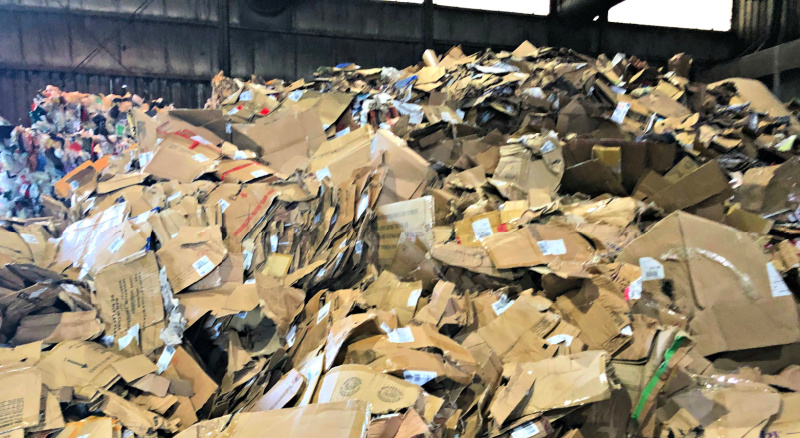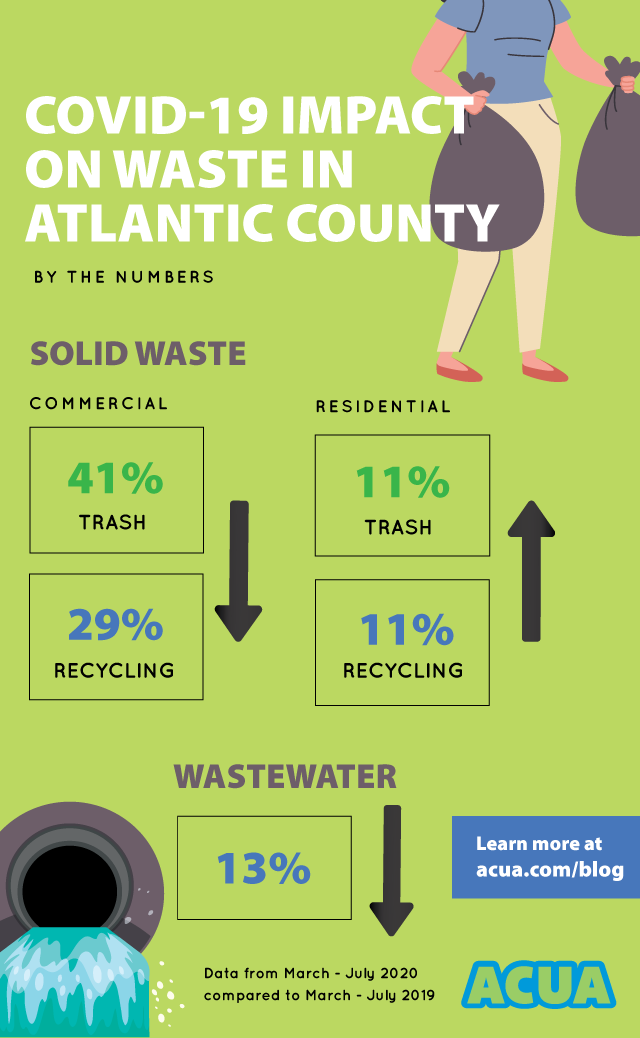Aug 26, 2020
We often hear about unemployment numbers or stock market fluctuations on the news as a measure on the state of society, but what about changes in our waste? While often overlooked, waste can provide helpful insights on our economic and social behaviors.
Here at ACUA, we have been tracking the impacts of the coronavirus and subsequent stay-at-home orders on waste trends across both our solid waste and wastewater divisions.

Our Findings in Solid Waste & Recycling
As most businesses were required to shut their doors or slow down service in the beginning days of the pandemic, we saw a correlating decrease in trash coming from commercial establishments.
From March through July, we measured a 41 percent decrease in commercial trash as well as a 29 percent decrease in commercial recycling when compared with the same time period in 2019. The decrease is not surprising but provides another look into the unfortunate realities our local business community is facing.
One unintended positive of this decrease is the environmental benefit of producing and landfilling less trash.
On the residential side, the opposite occurred. Residents were staying put, ordering in, and creating more trash and recycling than normal. From March through July, we measured an 11 percent increase in both household trash and recycling from Atlantic County municipalities when compared to the same time period in 2019.
We are awaiting complete data on the different categories of recycling material that we received during this time. However, using averages provided by the New Jersey Department of Environmental Protection (NJDEP) for household recycling materials, we are expecting to see a 10 percent increase in cardboard packaging.
National increases in online shopping and delivery services have created a demand for cardboard feedstock from packaging manufacturers. Most corrugated boxes contain an average of 50 percent recycled material, so your recycled cardboard is being put to good use, now more than ever!
As folks continued to focus on life at home, they were also rethinking their curbside containers. We saw a tremendous increase in trash and recycling container sales; between March and July, we sold 1,812 of our 96-gallon carts -- an 83 percent increase from last year.
More evidence of household clean-outs came through our household hazardous waste drop-offs. The events provide residents with an opportunity to safely and conveniently dispose of items that cannot be placed in the regular trash can like motor oil, chemicals, fertilizers, oil-based paint, etc. Our March and June events collected 98,848 lbs. of material, which is a 49 percent increase in material when compared to 2019.
The Impact on Wastewater
Another inadvertent environmental benefit could be found in the large decrease in water usage in our communities.
Our wastewater treatment facility in Atlantic City is responsible for treating wastewater (which is the dirty water that comes from our sinks, toilets, dishwashers, washing machines, etc.) from the homes and businesses located in the 14 municipalities that tie into our system. Since the pandemic caused the shutdown of many businesses, the flow of wastewater coming into the facility greatly decreased.
From March through July, we saw a 13 percent decrease in flows when compared to 2019. While many residents were home to flush their toilets and run their dishwashers more often than usual, this did not make up for the absence of large producers, such as the casinos in Atlantic City.
It is also interesting to note that emerging research is using wastewater as a tool to measure the exposure of COVID-19 in a community. Currently, tests are being performed in highly specialized and controlled laboratories. While individual testing continues to be the most effective tool in tracing the virus, wastewater may provide additional data to help scientists gauge its impact in the future.
